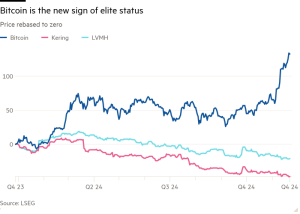Business schools step up executive coaching
Professional coaching has been good to Alejandra Badilla, helping to accelerate an already rapid rise. The 36-year-old Chilean, who will complete her Executive MBA at Madrid’s IE Business School late this year, started monthly coaching sessions over Microsoft Teams six months into the course. Soon afterwards, she was promoted to a director-level role at the insurance business Chubb, managing a $100mn portfolio of clients.
“I believe that everybody needs a coach, always, because your life is changing constantly,” says Badilla, who switched careers a few years ago, having trained originally as a physiotherapist. She also has experience in the health and financial sectors and was a convert to coaching long before starting at IE. “For me, it is like a religion.”
EMBA providers increasingly emphasise the importance of executive coaching. According to 2023 research by the Executive MBA Council (EMBAC), a network of schools, more than 87 per cent of its member programmes offered a coaching service, up from 58 per cent in 2011.
Prospective students are also demanding coaching. The most recent Tomorrow’s MBA study, by higher education consultancy CarringtonCrisp and the European Foundation for Management Development, found executive coaching was the second most demanded career development service sought by prospective EMBA candidates, just behind mentoring.
Randall Peterson, professor and academic director of the Leadership Institute at London Business School, was involved in the decision to increase coaching for LBS EMBA students six years ago. The shift was driven by the reality that coaching was, even then, standard for senior executives.
“The logic . . . was that these students didn’t have much experience of it, so let’s get them used to the idea of coaching accelerating their careers,” Peterson says.
He adds that it was also important to differentiate in students’ minds the practices of coaching from other forms of careers support. “We wanted to show that it is not therapy and it is also not mentoring, in that they are not going to tell you to do X and Y,” Peterson says. “What coaching does is support your thinking about where you want to go and how you want to get there.”
Coaching EMBA students “presents unique challenges” because they are studying while holding down often senior full-time jobs and balancing competing demands on their time, says Sarah Langslow, executive coach and author of Do Sweat the Small Stuff. But, she adds, it can also be the best time to be coached.

“We can work on their leadership, communication, influence, executive presence and so on in the context of their working environment, not only their MBA class environment,” Langslow says. “Coaching on live challenges allows direct challenge and support, and the chance to follow up to explore the impact of their changes in behaviour and approach.”
Few business schools hire coaches as staff members, usually preferring to use freelance professionals. Los Angeles-based Sue Ann Gonis, a former business executive who has been a certified coach since 2008, supports students on the Executive MBA at the Ross School of Business at the University of Michigan.
Gonis says she can relate to EMBA candidates who are often in senior roles and looking to switch to other sectors or professions “because I have made a career shift”.
Executive MBA Ranking 2024

This is a story is from the EMBA report publishing on October 14
Her services are also in demand when Michigan Ross students come to LA, where she runs workshops with the cohort and follows up with Zoom calls.
Christoph Kiegler experienced private coaching before his Global Executive MBA at Barcelona-based Iese Business School, having hired a coach to support his rise to partner at KPMG, his employer of more than 20 years.
He and the approximately 40 participants on the GEMBA programme were offered four executive coaching sessions as part of the course’s leadership element.
Kiegler says he valued these interactions highly, particularly as Iese was able to pair him with a fellow German-speaking coach. But he adds that those who want to benefit fully from the process should continue after they graduate, something that Iese also offers.
“As a senior executive, the only way to grow is by such self-reflection, [but] having four sessions with the coach is not enough to get to something very specific,” he says.
Kiegler admits, however, that he has not used an executive coach since the GEMBA, blaming demands on his time. “It is like sports: I know I should do it because it’s good for me,” he says — adding that he also struggles to find time for those activities.
The process of coaching involves more work than just the time spent in one-to-one sessions. Alejandra Badilla’s coach at IE Business School recommended self-help books for her to read, worked together with her to discover aspects of her character that might help in achieving career goals, and assisted with strategies to capitalise on personal strengths.
“If you don’t have the ‘mirror’ to question you all the time, who sees your best skills, you won’t be aware of what you are best able to do,” Badilla says. “I have some friends, older than me, who always had a coach and they are successful people. On the other side, I have friends who are not open to that experience and they have been doing the same [job] for the last 10 years.”
Considering an EMBA?
Join our free online event, Spotlight on the Executive MBA, on Wednesday October 16. Register at emba.live.ft.com
#Business #schools #step #executive #coaching





